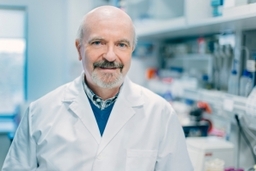| Professor Víctor de Lorenzo (National Center for Biotechnology, Madrid) |
| Thu 22 Jun 2017, 12:00 - 13:00 |
| C.H Waddington Building, Seminar room 1.08, King's Building's |
If you have a question about this talk, please contact: Julie Fyffe (jfyffe)

Transcriptional noise is a necessary consequence of the molecular events that drive gene expression in prokaryotes. But noise is not only the mere consequence of stochasticity, but also a signal that reflects the upstream physical dynamics of the cognate molecular machinery. This has been evolutionarily exploited to deploy beneficial phenotypes such as metabolic bet-hedging and/or division of biochemical labour. Experiments with engineered bacteria in which the distance between transcription factors and target promoters is minimised or enlarged exposed the effect of source/target proximity on noise patterns. This approach allowed deconvolution of cytometry data into mechanistic information on gene expression flow. It also provided a basis for selecting programmable noise levels in synthetic regulatory circuits.
Bio: Victor heads the Laboratory of Environmental Molecular Microbiology at the National Center for Biotechnology. He specializes in Molecular Biology and Biotechnology of soil bacteria (particularly Pseudomonas putida) as agents for the decontamination of sites damaged by industrial waste. In 2001 this work received the National Award King James I for Environmental Protection. In June 2008 he received the GSK International Award of the American Society for Microbiology, and in October of the same year he was granted a Grand Prix of the French Academy of Sciences. He is a member of the EMBO (European Molecular Biology Organization) and the American Academy of Microbiology, and he has co-chaired with Drew Endy the EC-US Working Group on Synthetic Biology. He has also Co-chaired the EC President’s Science and Technology Council. He has published over 300 articles in scientific journals and specialized books (https://goo.gl/oeY5v9), and he has served as advisor of numerous international panels. His current work maps at the interface of Synthetic Biology with Environmental Biotechnology.


